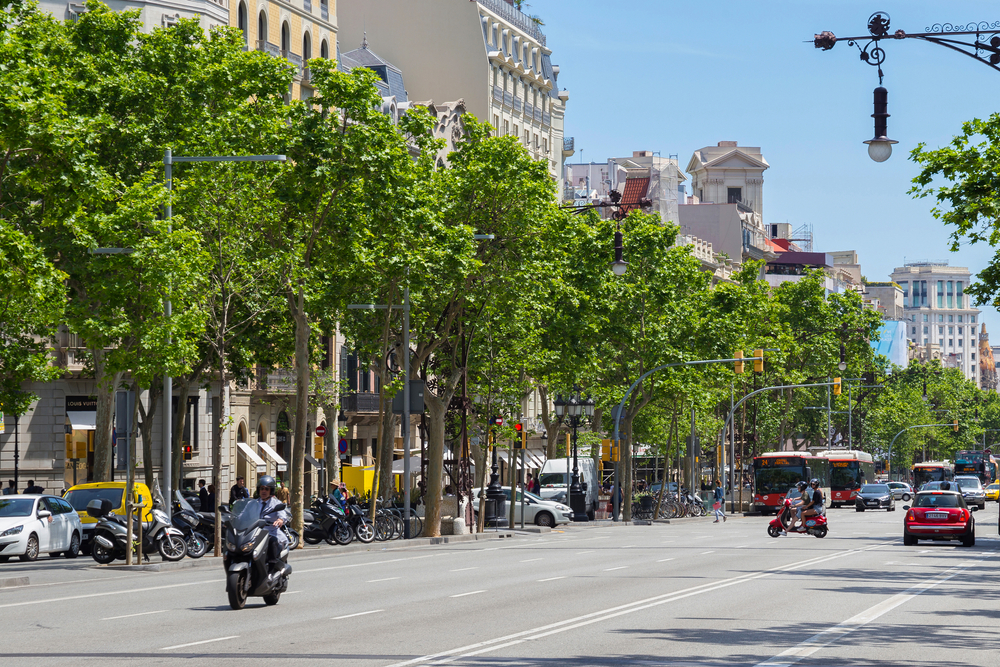Driving and Autos: Driving Conditions
The information below has been excerpted from the following: 1) the US Department of State's "International Travel" website (travel.state.gov/travel/), 2) the Australian Department of Foreign Affairs and Trade's "Smartraveller" website (www.smartraveller.gov.au), and 3) the UK Foreign and Commonwealth Office's "Foreign Travel Advice" website (www.gov.uk/foreign-travel-advice/). Additional information is available from these sources. World Trade Press annually assesses the information presented on this page.
United States: Department of State International Travel Information
While in Spain and Andorra, you may encounter road conditions that differ significantly from those in the United States.
Traffic in Madrid and Barcelona is faster paced than in U.S. cities and can be unnerving because of unfamiliar signs or motorbikes weaving between traffic lanes. Drivers should always obey the closest traffic light, as there are separate pedestrian lights in the cities. Drivers should be alert when driving at night in urban areas because of the possibility of encountering drivers or pedestrians under the influence of alcohol. Night driving in isolated rural areas can be dangerous because of farm animals and poorly marked roads. Rural traffic is generally heavier in July and August as well as during the Christmas and Easter seasons.
Traffic regulations in effect in Spain include the prohibition on the use of a mobile phone without a hands-free device while driving a car. There is a fine of 300 euros for violation of this regulation and loss of driving privileges. In addition, all drivers and passengers are required to carry a reflective vest and put it on if they need to stop on the roadside. A reflective triangle warning sign for a vehicle stopped on the side of the road is also mandatory. Those renting vehicles are encouraged to check with the rental company about traffic regulations and safety equipment. U.S. citizens must obtain International Driving Permits prior to their arrival if they plan to drive in Spain. You are not allowed to drive on your American license. While rental car companies may rent a vehicle to you without the International Driving Permit, this is illegal and, if pulled over for a traffic violation, your rental car may be detained and towed to the nearest impound lot. Pedestrians should use designated crossing areas when crossing streets and obey traffic lights.
One of the facets of Spanish traffic laws that many U.S. citizens find troublesome is traffic stops by the Spanish National Police or the Guardia Civil. Unlike in the United States where drivers receive traffic tickets and then pay the court via mail or in person, Spanish police authorities may levy fines on the spot and issue a receipt for the payment. This is done to ensure the traffic fine is paid by foreigners who rarely come back to Spain to pay the fine.
Public transportation in large Spanish cities is generally excellent. All major cities have metered taxis, in which extra charges must be posted in the vehicle. We advise travelers to use only clearly identified cabs and to ensure that taxi drivers always switch on the meter. A green light on the roof indicates that the taxi is available. If you have a problem or suspect you are being over charged, ask for an official receipt. The license number for the taxi should be located in a metal plaque by the passenger window. This number identifies a specific taxiand can prove useful in the event of forgotten property or if you decide to file a complaint. Rail service is comfortable and reliable, but varies in quality and speed. Intercity buses are usually comfortable and inexpensive.
Please refer to our Road Safety page for more information. For specific information concerning Spanish driving permits, vehicle inspection, road tax and mandatory insurance, please contact the Spanish National Tourist Organization offices in New York.
Australia: Department of Foreign Affairs and Trade Travel Advice
Driving in Spain can be dangerous due to traffic congestion in urban areas, aggressive driving practices and excessive speed. For further advice, see our bulletin on Overseas Road Safety. Australian tourists driving in Spain are required by law to carry their valid Australian State or Territory Driver Licence, as well as an International Driver Licence.
The annual Running of the Bulls takes place in Pamplona in July. Participating in the running of the bulls is dangerous. Each year, some participants are seriously injured and numerous deaths have occurred over the years. Some Australians jump off fountains during the festivities in Pamplona. This activity has resulted in severe injuries and death. Your travel insurance may not cover you if you participate in the running of the bulls or jumping from fountains. You should carefully check the details of your insurance policy.
During summer some areas of Spain, including the Balearic Island of Ibiza, are popular party destinations. We recommend you read our travel bulletin 'Partying Overseas' for tips on partying safely.
United Kingdom: Foreign and Commonwealth Office Foreign Travel Advice
Driving is on the right. Driving rules and customs are different from those in the UK and the accident rate is higher, especially on motorways. In 2011 there were 2,056 road deaths in Spain (source: DfT). This equates to 4.5 road deaths per 100,000 of population compared to the UK figure of 3.0 per 100,000 of population in 2011.
You must carry two red warning triangles which should be placed, in the event of an accident or breakdown, in front of and behind the vehicle. You must have a spare pair of glasses (if needed for driving), a spare wheel, and a full set of spare light bulbs plus the tools to change them. If at any time you have to leave your vehicle due to an accident or breakdown or while waiting for the arrival of the emergency services, you must wear a reflective jacket or you may face a heavy fine. UK provisional licences are not valid for driving in Spain.
Carry a certificate of insurance in case you’re stopped. If you are using UK insurance, always carry your certificate with you. Remember that this certificate is generally only valid for a stay of less than three months - contact your insurer if you are staying longer.
Spain has strict drink driving laws. Penalties include heavy fines, loss of licence and imprisonment.
Seat belts are required for all passengers in the front and back seats. No children under the age of 12 should be in the front seat and small children must be in an approved child safety seat in the back seat. Your car hire agency will be able to provide a seat so let them know you need one when you reserve the car.
Talking on a mobile phone when driving is forbidden, even if you have pulled over to the side of the road. You must be completely away from the road. Using an earpiece is also prohibited but you are allowed to use with a completely hands-free unit.
See the AA and RAC guides on driving in Spain.
Copyright © 1993—2025 World Trade Press. All rights reserved.

 Spain
Spain 
